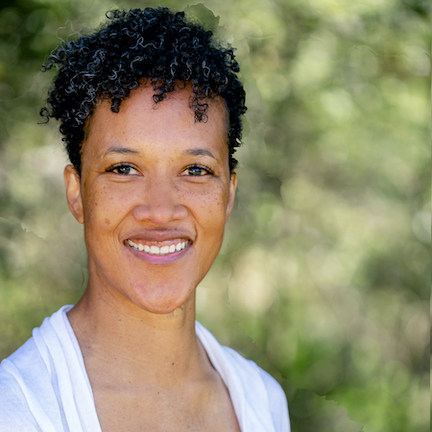by Kamala Itzel Hayward
In life, many of us find ourselves navigating the world based on societal constructs and internalized beliefs. We may view ourselves as limited beings bound within the temporal and spatial confines of the body and mind. The passing of time may drive us, making us feel perpetually bound to the past or anxiously anticipating the future, making it difficult for us to live in the present. There may be a persistent sense of lack—a feeling that we’re inherently flawed or missing something essential—which can lead us to question our existence, causing confusion and a feeling of detachment. All this can contribute to a pervasive feeling of “otherness” that dominates our lives, leading us to believe that we’re isolated entities, separate from the world and others. This sense of who we are stands in stark contrast to what Yoga teaches us: that our true, unconditioned nature is one of interconnectedness and wholeness.
The first time I stepped into an Integral Yoga class as an adult, I was acutely aware of how others perceived and treated me differently based on my various social identities: Black, cis-woman, able-bodied, and so on. But within the four corners of my mat, as I moved through each of the elements of that Integral Yoga class, I experienced a profound awakening to my unconditioned beingness—spacious, timeless, perfect, clear, connected, complete, and inherently whole, transcending the confines of societal labels and perceived limitations.
I came into direct contact with one of the foundational paradoxes of Yoga: we are human beings, in human bodies, having human experiences—which includes layers of societal constructs, personal narratives, and perceived limitations. And, at the same time, we are, at our essence, spacious, timeless, and inherently whole. And just as a single drop of water can create ripples across a large expanse of water, this moment of unity profoundly changed me and the course of my life.
As the primary gateways to this practice for many, Yoga spaces provide a rare opportunity for each one of us to experience that gift.
My experience of many Yoga spaces, however, has been quite different.
While many Yoga spaces speak of unity in their teachings, they don’t seem to fully grasp the lived humanness of their students. One example of this is when Yoga spaces operate in such a way as to attract a homogeneous demographic of students and teachers, inadvertently excluding those who don’t fit a specific mold, which all too often is that of a white, young, thin, flexible, able-bodied, cisgender woman who uses brand-name fitness gear. This not only contradicts Yoga’s fundamental teachings of unity and interconnectedness but also undermines the potential for Yoga spaces to be a sanctuary of true inclusivity and oneness.
When Yoga spaces don’t operate in a way that is inviting to a wide range of humanity—when they ignore the realities of the world and the varied ways different human beings experience it—such spaces are communicating, either overtly or subtly, that Yoga isn’t for everyone. That if you don’t fit that very narrow band of demographics, Yoga isn’t for you.
But the truth is that Yoga—the practice of recognizing the infinite, universal spirit that resides within and around each and every one of us—is for everybody.
There are many ways that Yoga spaces can work to shape themselves into a sanctuary in which every individual—regardless of their racial, social, or economic background, or of any other label or identity they may hold—can find belonging, validation, and access to the core tenets of Yoga. One way the Integral Yoga Institute San Francisco has done so is through its creation of a scholarship-based Black, Indigenous, People of Color (BIPOC) 200-hour Basic Yoga Teacher Training.
This teacher training was first hosted by IYI SF in 2021, made possible by the support of community members and Integral Yoga sangha members who contributed generously in the form of donations, spreading the word, and love and encouragement.
The news of the success of the 2021 training traveled out like ripples through the community, drawing enough additional support to hold a second training in 2022. With your support, these ripples can expand even further, allowing IYI SF to host a third scholarship-based BIPOC Basic Yoga Teacher Training in 2024 and also offer BIPOC scholarships for advanced Yoga teacher trainings as well.
One way you can support the continuation of the scholarship-based BIPOC Teacher Training is by attending the first BIPOC Scholarship Retreat, Ripples For Change. Scheduled for Saturday, October 21, 9:30am-6:00pm, this one-day retreat offers Hatha Yoga, drumming and dance, Yoga Nidra, sound bath, poolside activities, henna, crystal readings, and much more! 100% of the profits will go toward the BIPOC scholarships fund, which makes the BIPOC basic Yoga teacher training—as well as BIPOC participation in other advanced Yoga teacher trainings—accessible to people who wouldn’t otherwise have the financial means to participate.
Even if you’re not available to attend the retreat, you can still donate here to help fund scholarships to help eliminate financial barriers to BIPOC participation in any of Integral Yoga SF’s Yoga teacher trainings.
We embrace the profound unity that Yoga teaches when we understand that our collective liberation is intertwined. As civil rights activist Fannie Lou Hamer pointed out, “Nobody’s free until everyone is free.” In supporting the BIPOC TT scholarship fund, you affirm that our shared freedom is grounded in our oneness. You help to ensure that even more people have the opportunity to awaken to their boundless essence, breaking free from societal confines and truly experiencing the universality of spirit. Each gesture of support isn’t just making a singular difference—it’s helping to create ripples for change.
Thank you, Om Shanti, Shanti, Shanti.
After practicing law for 13 years, Kamala Itzel Hayward left her successful legal career to pursue social justice work through the lens of mindfulness and wellness. Today, she is a Yoga teacher, Yoga therapist, and Yoga teacher trainer. In addition to sharing Yoga and other transformational practices, Kamala is also a mindful communication trainer, an antiracism educator, and a fierce and compassionate advocate for love. You can learn more about Kamala at attunedliving.com


